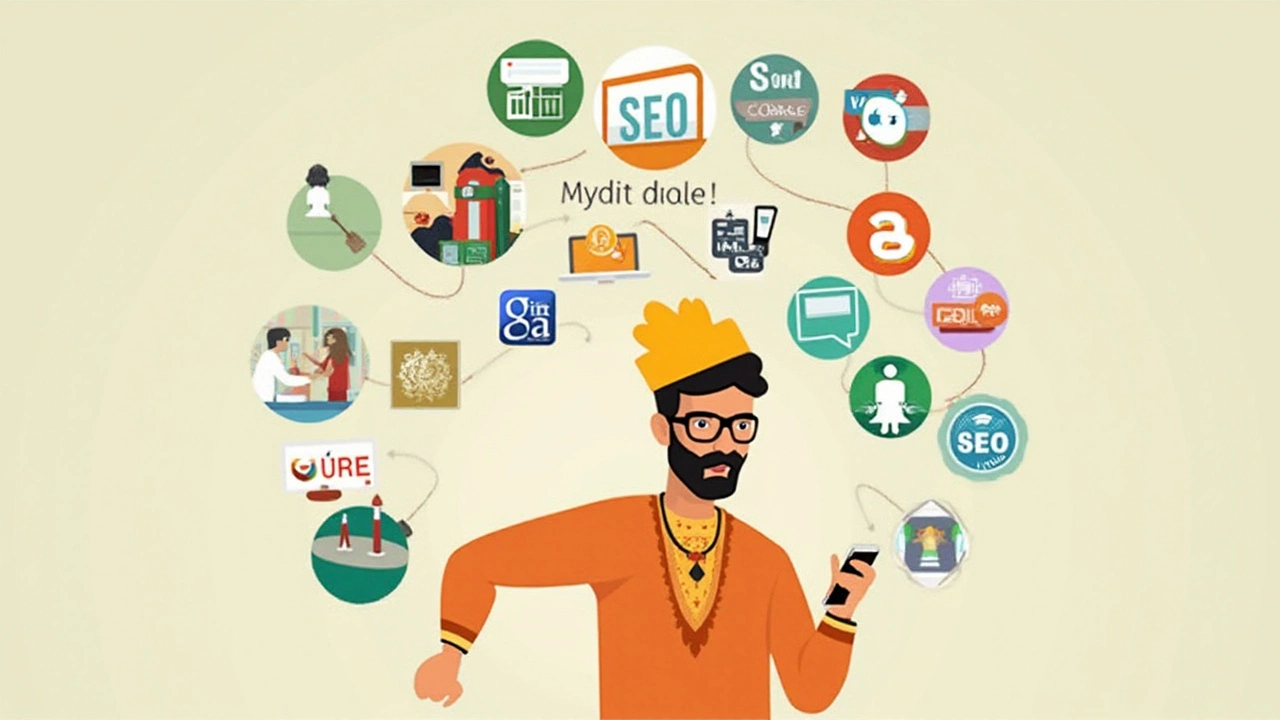In today's fast-paced world, the ability to quickly learn and adapt is invaluable. Digital marketing, with its myriad tools and platforms, is a field that welcomes newcomers with open arms, providing ample opportunities for a swift yet thorough education. The question of whether one can grasp its fundamentals in a mere 30 days is both intriguing and pertinent.
While becoming a complete expert might be a stretch, diving into this dynamic domain and learning its core elements is entirely feasible within a month. Whether you're a curious beginner or aiming to enhance specific marketing skills, embarking on this journey can open many doors, professionally and creatively.
With a detailed plan, the right resources, and a bit of tenacity, your digital marketing prowess can indeed take flight within a month. As we delve deeper into this topic, let's look at the methods, tools, and mindset needed to make this learning sprint successful.
- Understanding Digital Marketing Basics
- Choosing the Right Learning Resources
- Effective Learning Strategies
- Practical Application and Experimentation
- Measuring Success and Continuous Learning
Understanding Digital Marketing Basics
When stepping into the realm of digital marketing, it's crucial to start by understanding its foundational components. At its core, digital marketing is all about promoting products or services through various online platforms and technological channels. These channels are vast and varied, including search engines like Google, social media networks such as Facebook and Instagram, email marketing, and content creation. Each platform comes with its own set of rules and best practices, making the initial learning curve quite an adventure.
A pivotal element of digital marketing is Search Engine Optimization (SEO). SEO focuses on optimizing website content to rank higher in search engine results, thereby increasing the visibility of your content to potential audiences. Keywords play a significant role here, as they help search engines understand the relevancy of your page. Knowing how to strategically place these is a skill that can significantly boost your website's traffic. Another vital aspect is understanding the dynamics of social media marketing. Social media channels have become a formidable force in digital marketing, offering businesses direct access to their audience. Crafting engaging content that resonates with users can drive traffic, increase brand awareness, and encourage consumer interaction.
"Marketing is no longer about the stuff that you make, but about the stories you tell," said Seth Godin, a widely respected figure in the digital marketing field. His words underscore the importance of storytelling and content creation in this space. Digital marketing thrives on well-told stories that connect emotionally with audiences, making the art of content marketing indispensable. Content can be anything from blog posts and videos to infographics and podcasts. The key is to ensure that whatever is created is both relevant and relatable to your target demographic.
For those just starting, Pay-Per-Click (PPC) advertising offers another avenue for quick visibility. Unlike organic strategies like SEO, PPC advertising can offer instant results as you pay for each click your ad receives. This method is particularly effective for reaching highly targeted audiences, as ads can be tailored to the specific demographics, interests, or locations of users, helping businesses maximize their marketing efforts.
Let's not forget about analytics, a fundamental part of digital marketing that allows brands to measure and understand their performance. Analytics provide deep insights into user behavior and campaign performance, guiding marketers on what changes or adjustments need to be made. With tools like Google Analytics, businesses can track various metrics such as page views, bounce rates, and conversion rates, providing a detailed snapshot of how well marketing strategies are working.
For marketers, these basics are just the beginning. Each element, from SEO to content marketing, interacts and complements each other to form a cohesive strategy. The beauty of digital marketing lies in its adaptability and scope for innovation, offering endless potential for those eager to dive in and explore.
Choosing the Right Learning Resources
Embarking on a journey to learn digital marketing in a month requires you to meticulously select learning resources that align with your goals and learning style. The internet is teeming with options, from immersive online programs to insightful webinars and community forums. Navigating this ocean of information demands discernment. Begin by identifying platforms that offer structured courses on digital marketing. Websites like Coursera, HubSpot Academy, and LinkedIn Learning provide comprehensive programs that cover key areas such as SEO, social media, and analytics.
Each program typically offers a balance of video lectures, readings, and quizzes to solidify understanding. Some platforms even offer certifications, adding value to your learning journey. When choosing a course, consider not only the breadth of topics covered but also the depth in each area. A course should not merely scratch the surface but offer a thorough dive into the nuances of digital marketing strategies. It's crucial to look at reviews and feedback from former students to gauge the course’s effectiveness and practical application in the field.
Don't overlook the power of community learning. Joining groups on platforms like Reddit, Facebook, or even specialized Slack channels for marketing professionals can provide invaluable insights and real-time problem-solving assistance. The collective knowledge and support found in these communities can often bridge gaps left by formal education. One of the hidden gems in learning is participating in webinars conducted by industry experts. These sessions not only update you on the latest trends but also offer a chance to ask questions and gain practical insights directly from practitioners.
"The only way to win at content marketing is for the reader to say, 'This was written specifically for me.'" – Jamie Turner, CEO of 60SecondMarketer.com.For those who prefer learning at their own pace, podcasts and blogs become indispensable. Podcasts such as 'Marketing Over Coffee' and blogs like Moz's provide regular updates and tips that enhance learning. Subscribing to newsletters from industry giants can also keep you informed about the latest changes and trends, ensuring your learning is always up-to-date.
Ultimately, choosing the right learning resources is about identifying what works best for you. Whether it involves structured courses, community learning, or self-paced articles and podcasts, the key is consistency and a genuine curiosity about the evolving world of online marketing. Allocate time each day for study and maintain a journal for noting crucial takeaways. This keeps your learning organized and makes it easier to revisit concepts that might need reinforcement. Remember, the wealth of knowledge available at your fingertips needs to be harnessed intelligently. By selecting the right mix of resources, you can ensure your journey into digital marketing is both productive and rewarding.

Effective Learning Strategies
Taking up the challenge of mastering digital marketing in just one month requires a structured and strategic approach. First and foremost, it’s essential to cultivate a learning environment that is both productive and distraction-free. Dedicate specific hours each day to focus solely on learning, ensuring these times are free from interruptions. Creating a schedule that integrates various learning methods can significantly enhance retention and understanding. For instance, combining visual tutorials with reading materials can cater to different learning preferences, increasing the effectiveness of your study sessions. Incorporating breaks and reflection time is equally vital, as it allows for mental processing of new information.
One highly effective strategy is leveraging online resources that offer comprehensive and organized content suitable for accelerated learning. Platforms such as Coursera, Udemy, and LinkedIn Learning provide curated courses from industry experts. Many of these courses are structured to guide learners through the fundamentals up to more advanced topics, making them ideal for a one-month learning sprint. Don’t just rely on listening or reading; engaging actively with the material can help amplify learning. This includes taking notes, participating in forums, and applying concepts practically, such as setting up a mock campaign or experimenting with SEO tactics.
The power of community should not be underestimated. Joining online groups or communities related to digital marketing can provide support, motivation, and fresh insights. Engaging with peers facing the same challenges can foster a sense of camaraderie that enhances the learning journey. Seeking feedback from others on your progress can help identify areas of improvement. Harvard’s Clayton Christensen once mentioned the impact of collaboration on learning:
"The best way to learn isn’t just from textbooks, but through genuine interaction and collaboration."This underlines the importance of not learning in isolation. Pairing up for study groups or peer reviews can offer a fresh perspective and reinforce your understanding of complex subjects.
Integrating these methods with real-world practice significantly enhances understanding. It’s not just about absorbing information; it’s about applying it. Set personal projects or objectives to test your new skills. Whether it’s optimizing a blog for SEO or running a small social media campaign, practical application is key. This approach bridges the gap between theory and practice, embedding knowledge more effectively. Reinforce your understanding by reviewing progress weekly to adjust strategies as needed, which ensures continuous improvement and encourages a proactive learning mindset.
Finally, remember the importance of reviewing and revising. Frequent revision sessions can help consolidate knowledge and highlight any areas that may need extra attention. Use tools like flashcards for quick reviews or apply the Pomodoro Technique to improve focus and avoid burnout. Maintaining balance in this intense learning period is crucial to prevent overwhelming yourself. This strategic approach ensures that by the end of the month, learners not only understand the basic concepts of digital marketing but also have the confidence to apply them effectively in real scenarios.
Practical Application and Experimentation
Transitioning from theory to practice is a vital step in mastering digital marketing quickly. Think of it as the difference between reading a cookbook and preparing a sumptuous dish. To truly grasp digital marketing concepts, applying them in real-life scenarios can be hugely beneficial. Begin by setting a simple project—perhaps starting a small blog or a social media page dedicated to a hobby or interest. This allows you to experiment with different online marketing strategies and observe the outcomes firsthand. By creating content, experimenting with keywords, and engaging with your audience, you start developing a marketer’s mindset.
According to a study by HubSpot, companies that publish 16 or more blog posts per month receive about 3.5 times more traffic than those that publish less than four posts. While quantity is not always the key to success, experimenting with content frequency can be an eye-opening experience. Perhaps you choose to draft and share a variety of content—short posts, in-depth analyses, or interactive videos. Observations from these activities can help you learn what resonates with your audience, tailoring strategies accordingly.
Next, consider diving into social media campaigns. Platforms like Facebook, Instagram, and LinkedIn each have unique demographics and engagement styles. By running small ad campaigns, even with a minimal budget, you learn how to target the right audience effectively. Monitor metrics such as click-through rates and conversion data, as these will provide insights into your strategy's effectiveness. As legendary entrepreneur Peter Drucker noted, "What gets measured gets managed."
"The best way to predict the future is to create it." — Peter Drucker
Establishing a solid understanding of analytics is another pillar of practical application. Utilize free tools like Google Analytics to track website performance, user behavior, and traffic sources. This data is invaluable in refining strategies, allowing a marketer to make informed decisions based on what's actually working versus what’s merely speculation. By interpreting these metrics, you learn to adjust your tactics to optimize for better results, achieving set goals more effectively.
Finally, networking with fellow marketers can expedite learning significantly. Join online communities, attend webinars, and participate in forums relevant to digital marketing. By exchanging experiences and knowledge, you not only gain new perspectives but also discover opportunities for collaboration and support. Many marketers have found that these interactions lead to unforeseen insights and innovations, helping them to grow far beyond initial expectations. Embrace this community for both learning and inspiration as you continue your digital marketing journey.

Measuring Success and Continuous Learning
Embarking on your journey to learn digital marketing in a mere month requires not only dedication but also a clear strategy to measure your progress. It's essential to set realistic and specific goals from the outset. These could include understanding essential concepts such as SEO, social media strategies, or achieving a certain number of page views on a newly created website. Tracking these goals will help determine whether your learning methods are effective. You might use tools like Google Analytics to gauge website traffic, or social media analytics to measure engagement on your posts.
For effective progress tracking, introduce a schedule with regular check-ins to evaluate what you have learned and where you still need improvement. The beauty of digital marketing lies in its vast array of analytics tools that offer real-time feedback on almost every metric. A simple spreadsheet documenting your progress could do wonders. Make sure to celebrate small victories, like understanding a complex concept or successfully using a new tool. These milestones build momentum and motivation.
"Success is not final, failure is not fatal: It is the courage to continue that counts," said Winston Churchill, an excellent reminder that the learning process is ongoing.
The journey doesn't end once the month is over. The digital world is ever-evolving, meaning continuous education is critical. Subscribing to marketing blogs, joining online forums, attending webinars, and participating in digital marketing groups on social media can keep you updated. Consider dedicating weekly time to update what you've learned, ensuring that old techniques are not misunderstood or misapplied. A journal or blog where you document your learning can also be beneficial, providing both a reference and a new way to process information.
Another key to success is learning from others. Connect with digital marketing communities. Engage on platforms like LinkedIn, where professionals often share insights and case studies. Sharing your experience not only helps in building your network but also provides access to diverse perspectives that can enrich your understanding of marketing strategies. Always be open to feedback, as it often offers new viewpoints and ideas. Learning fast is great, but learning humbly ensures the knowledge is well-rounded.
A long-term, sustainable learning strategy will include keeping pace with changes in the field. For instance, Google frequently updates its algorithms, which can impact SEO strategies. Keeping abreast of these changes is crucial. To aid continuous learning, you might want to consider short courses or certifications that can further validate your knowledge and skills. Free and accessible platforms like Coursera or HubSpot Academy offer a range of courses that ensure you're not just caught up with the latest trends but are ahead of the curve.
Ultimately, the most successful digital marketers are those who see learning as an ongoing process rather than a destination. They remain curious, always eager to explore deeper into niche topics or pioneering technologies. Adopting this mindset not only elevates your digital marketing efforts but enriches your professional life as a whole.
